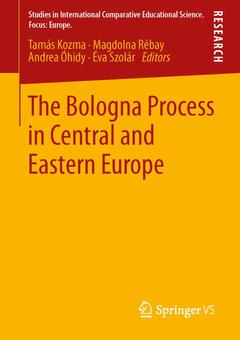Description
The Bologna Process in Central and Eastern Europe, 2014
Studien zur international vergleichenden Erziehungswissenschaft. Schwerpunkt Europa - Studies in International Comparative Educational Science. Focus: Europe. Series
Coordinators: Kozma Tamás, Rébay Magdolna, Óhidy Andrea, Szolár Éva
Language: English
Subject for The Bologna Process in Central and Eastern Europe:
371 p. · 14.8x21 cm · Paperback
Description
/li>Contents
/li>Biography
/li>Comment
/li>
Bologna Process.- Comparative Education.- Central and Eastern Europe.- Higher Education.
Prof. Dr. Tamás Kozma is emeritus professor at the University of Debrecen, Institute of Educational Studies (Hungary).
Dr. Magdolna Rébay is senior lecturer at the University of Debrecen, Institute of Educational Studies (Hungary).
Dr. Andrea Óhidy is researcher at the University of Magdeburg, Institute of Education (Germany).
Éva Szolár is junior researcher at the Partium Christian University (Oradea, Romania).
New articles in social sciences
Includes supplementary material: sn.pub/extras
These books may interest you

Globalization and Change in Higher EducationThe Political Economy of Policy Reform in Europe 147.69 €



